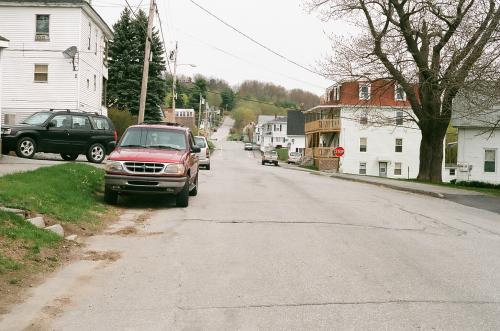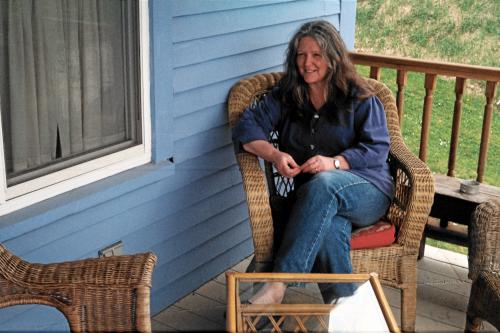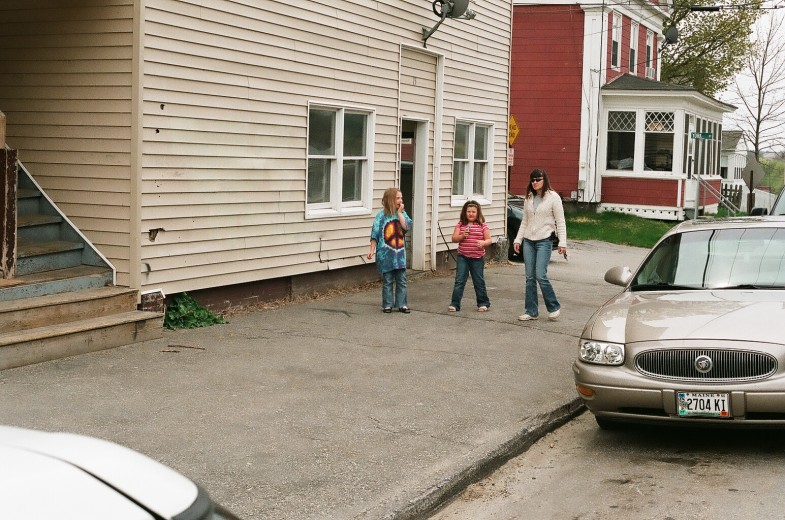Let’s roust one another from the fear and stupor of the global economic crash. We have work to do to transform the economy we’ve created on the commons. It isn’t the breakdown of worldwide financial trading and credit that makes life miserable, nor would restoring the economy to its condition before the crisis make life more worth living. Returning to the way things were is no answer for how to forge a decent way of life. The rush of western culture to consume more than it needs and sell consumption around the globe as life’s highest purpose has met its logical end as simply too much of nothing much at all.
As I live and write in a little house on a small lot in Augusta, Maine, I breathe in the stoic veneer covering sharp anxiety all around this place. I’m unemployed, although I gave ample notice of my resignation last October, so my joblessness isn’t a result of the international financial mess and continuing rounds of layoffs. Savings I socked away while I had a job are paying the bills for now. I’m grateful for time to attend to important things, like my marriage, fleeting phone calls with my busy daughter, and long talks with Phoebe, our stray long-haired cat who moved in shortly after Sammy, the last of four long-lived short-hairs, died a couple years ago.
 p(photo-credits). -photo by Charlie Bernstein_
p(photo-credits). -photo by Charlie Bernstein_
There’s time to notice the last of the gritty snow melting in the drizzle of spring rain and listen for the postal truck as it climbs the long incline to our mailbox. I have abundant time to read and keep in touch with friends and neighbors, volunteer for community projects, make dinner and stir up a batch of pumpkin bread for breakfast. When the soil warms up and dries out a bit, there will be time to plant a garden and grow food that tastes better than produce from the grocery store, and visit the weekly outdoor market at the foot of our hill to buy food from people who produce it on their small farms outside town.
 p(photo-credits). photo by Charlie Bernstein
p(photo-credits). photo by Charlie Bernstein
I’m privileged to have all I need and then some, and hope the anxious people with big mortgages and other commitments they can’t pay for will be able to restructure them, because oversized consumer debt carries unnecessary obligations that divert us from necessary ones. Mortgage lenders evicting people for lack of payment leave abandoned houses, deteriorating neighborhoods, and family and social disruption that diminish our resources for building an economy and common life that make sense. Let the homeless back into their homes, keep those on the brink of foreclosure under their debt-ridden roofs, and work out a simple arrangement for each focused on what they can contribute instead of what they can’t repay.
We need economic activity that heals instead of destroys the commons. For example, the road to my house, and maybe the one to yours, is an eyesore. The tar has crumbled for years as public funds for street maintenance have been outstripped by the costs of even basic care. Many of the old houses along its route are clad in noxious vinyl siding and need weatherization and repair. The yards could produce vegetables, fruit, and flowers where ragged lawns and broken pavement now prevail. Our neighborhood is powered by heating oil and electricity from coal-fired plants, neither one sustainable nor good for our health, while a breeze blows briskly from the river to the top of the hill, where a patch of public land owned by the local utility district could serve as a wind turbine site to generate electricity for the neighborhood.
 p(photo-credits). -photo by Charlie Bernstein_
p(photo-credits). -photo by Charlie Bernstein_
The view across the river includes a car dealership with bright electric lights on its vast paved lot, and an abandoned paper mill slowly leaching chemicals into the ground and water. The obligation here is to clean up the community and fill it with healthy houses, factories, shops, and services to sustain people who call this place home. There’s no local transit system to serve as an alternative to personal vehicles. Perhaps the auto dealer could run a trolley system instead, and we could recycle our cars, exchanging that pollution of the commons for cleaner dependable transport to work, schools, libraries, city hall, and modest shops owned and run by local people.
Here the schools face budget cuts, and perhaps we spend more than we should for the system we have. The children need educations, with inspired and inspiring educators to lead them in discovering how to refashion this place to be more livable, and encourage the bright and not-so-clever alike to engage with hope and resolve to build a stronger community and cleaner economy than we’ve passed on to them.
President Barak Obama said recently, “We cannot rebuild this economy on the same pile of sand.” This gives me pause, since the neighborhood I live in is named Sand Hill, and there is no other place for me to participate in rebuilding the economy but here on this same pile of sand. The ground we live on isn’t the problem, whether vast level farmland, gritty coastal ports, bustling great cities, or the semi-abandoned mill and mining towns like Augusta scattered across the nation. Wherever we may live, the point is that the change we seek isn’t a return to the past, but a transformation of the present. We have an opportunity to imagine beyond glib beliefs in free market capitalism, brutal competition, abandonment of those least able to earn a living, passive entertainment, and mindless consumption in order to focus on producing projects and products that make improvements now and leave a legacy worth building on for generations to come.
We can take practical steps, with hope that doing so will forge new paths to a better life for all of us. We can live more satisfying lives right now not only by reducing some types of consumption, but by increasing the quality of what we actually need to produce. This means consuming less of what is cheap and flimsy, shipped around the planet for sale at energy-guzzling consumer outlets, but more importantly it means producing more goods we need most, at a high level of quality, close to home. We can wade out of our worries into our communities, not to foist ideological opinions on one another about what went wrong, but to meet more of the people who live closest to us and deepen our exploration of what we really hope for and how to get there. And we can join the visionaries and leaders who risk taking a place at the table of public policy to forge a better way forward, debating and shaping the direction of the country, globe, and our common life together.
 p(photo-credits). -photo by Charlie Bernstein_
p(photo-credits). -photo by Charlie Bernstein_
Let’s responsibly produce, rather than only consume, what we really need – high quality food, energy, shelter, health care, clothing, transportation, education, sanitation, news coverage, art and music, just and merciful care for those unable to function in society. Shifting to clean sustainable energy alone will provide us with ample worthwhile employment in healing the damage we’ve done to the commons for generations to come. The dire financial situations so many of us face, with the emotional and social tolls these take, point us to a better life, one in which we responsibly produce what we need to consume and publicly push our economic system and institutions, parts of human culture we all create and share, to honor the unearned gift of the commons that gives us air to breathe, water to drink, and land, including humble hills of sand, to call home.
 p(photo-credits). -photo by Charlie Bernstein_
p(photo-credits). -photo by Charlie Bernstein_



